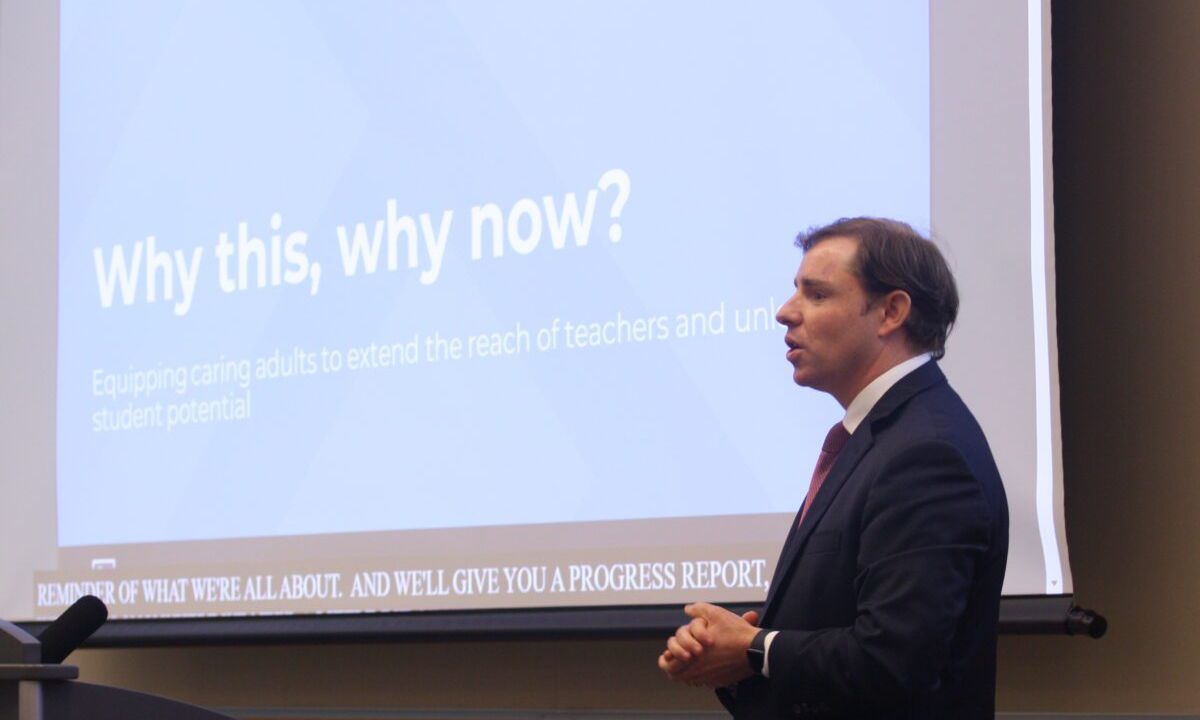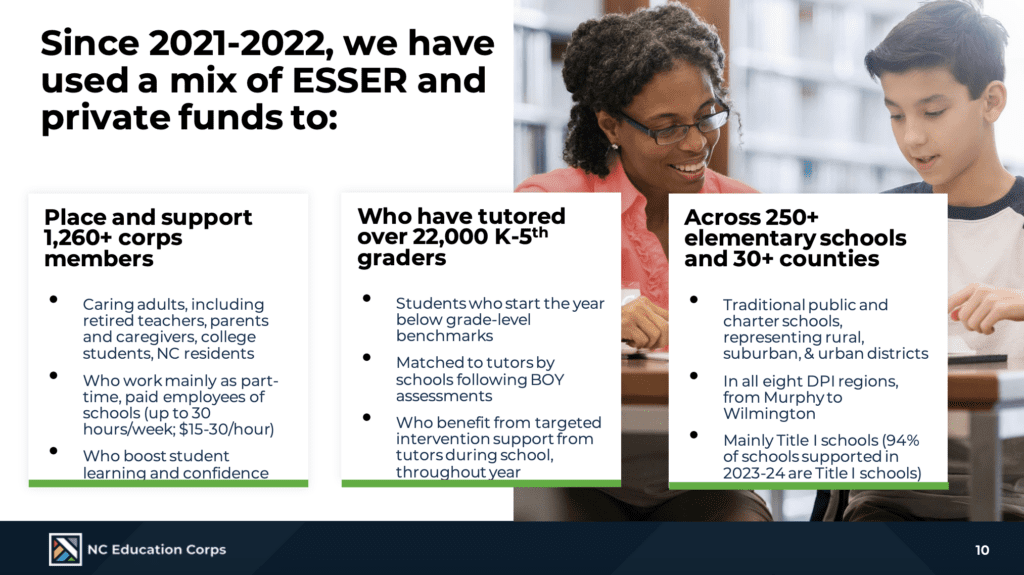NC Ed Corps Highlights Need for More High-Dosage Tutoring
Ed Corps was launched in 2020 at the start of the pandemic and during remote learning and is aligned with state-level standards for literacy.

Get stories like this delivered straight to your inbox. Sign up for The 74 Newsletter
As North Carolina celebrates the completion of its science of reading training for K-3 teachers and literacy gains for young students, nearly half of of early-grade students are still below grade-level benchmarks.
Part of the solution, NC Education Corps told the State Board of Education last week, is high-dosage tutoring, an evidence-based intervention for learning loss. Ed Corps was launched in 2020 at the start of the pandemic and during remote learning and is aligned with state-level standards for literacy.
“You’ve heard the phrase that it takes a village — we are working to equip the village beyond educators, specifically as high-impact tutors,” NC Ed Corps Executive Director John-Paul Smith told the Board. “For students who are starting behind coming into school, what they need is not only strong core instruction, but they also need some additional intervention, supplemental support. So that’s what the high-impact tutors are helping to provide.”
Since 2021-22, Ed Corps has placed and supported nearly 1,300 corps members who have tutored more than 22,000 K-5 graders across 32 counties. This was supported through a mix of Covid-relief and private funds.
Ed Corps is important, Smith said, because it is difficult for districts to implement high-dosage tutoring at scale alone. Finding high-impact tutors, training coaching paraprofessionals, tracking sessions, and identifying funds to pay for the tutoring all present a challenge.
“With your support, NC Education Corps is addressing these challenges, in alignment with high-impact tutoring best practices and the MTSS (multi-tiered systems of support) framework,” Smith’s presentation to the Board said.
Ed Corps started as an initiative of the Board, along with the Office of the Governor, in September 2020. Today, it operates as a 501(c)(3).
Here’s a look at some of the main components of Ed Corps’ model.
- Frequency: Tutors meet with students for at least three sessions each week, 30 minutes per session.
- Measurement: Schools use data to tailor instruction and ensure consistency.
- Small groups: Tutors work with 1-4 students to provide structured, targeted instruction and relationship-based support.
- Curriculum: Tutors use curriculum to reinforce foundational skills.
- Trained personnel: Tutors gain knowledge and skills needed to improve student outcomes, and receive professional development and coaching support.
Dr. Paula Wilkins, chief academic officer at Winston-Salem/Forsyth County Schools, spoke about the impact of the program in the district. During the 2023-24 school year, 432 students from 10 schools were served by 23 tutors in literacy skills.
“This is only one piece in a bigger, larger puzzle for our district, but we need more,” Wilkins said. “We need more help, and we need more funding to help… This work takes funding and support and intention.”
In addition to the coming cliff of federal Covid-relief funding, Smith said the expansion of private school vouchers and the upcoming election also increase financial uncertainty for districts.
In light of the reality that many districts will have less money to fund high-dosage tutoring, Smith said Ed Corps will be working to secure more funding from the state.
According to Smith’s presentation, the program costs roughly $1,200 per student to implement. Schools pay about $650 per student, primarily to pay for the tutoring wages. Ed Corps pays about $550 per student, which covers recruitment, training, coaching, and evaluation.
“We need your help in communicating that high-impact tutoring is not just ‘a nice to have.’ It’s really ‘a need to have’ if we truly do want all students to have the support that they need, starting early on, to succeed,” Smith said. “We need to continue to communicate that it’s going to take a while to see gains. Students are starting pretty far behind, and the gains that they’re making take a little while to show up on the academic assessment — we need to be patient.”
More on high-dosage tutoring model
According to Ed Corps’ website, high-impact tutoring “has been proven to provide significant learning gains for students in need.”
Ed Corps tutors work in Title I and/or low-performing schools, with students scoring below grade-level in reading and/or math. Based on a sample of 3,388 K-3 students served by tutors in 2022-23, 70.3% of students were identified as socioeconomically disadvantaged,
38.9% Black, 30.6% white, 20.8% Hispanic, 7.7% mixed race, and 0.3% American Indian.
“Tutors are working with high-need students in high-need schools to help them establish foundational literacy and math skills that are so critical to student success in school and future careers,” an Ed Corps handout says.
Literacy tutors are recruited, trained, and coached by Ed Corps. The tutors then work as part-time employees at partnering school districts, who pay for tutor time. Most tutors work 15 hours per week, but tutors can work up to 30 hours a week.
Tutors work with students during the school day — either joining them in the classroom or pulling them out of class for a session, depending on the school’s preference.
The vast majority of tutors are retired educators, Smith said, along with parents, community college students, and other retirees.
“High-dosage tutors are not simply providing homework help or reading aloud to students on an irregular basis,” the handout says. “They provide personalized instructional support to students as extensions of school instructional teams in alignment with multi-tiered systems of student support and as a supplement to core instruction.”

During the 2023-24 school year, Ed Corps launched K-5 math tutoring in Ashe, Chatham, Orange, and New Hanover counties.
Moving forward, Smith said they want to expand high-dosage tutoring to more schools, including math tutoring, based on school demand and funding availability.
Next school year, Ed Corps will partner with Accelerate, a national organization that supports various tutoring models that improve student outcomes. Accelerate is also “supporting promising tutoring initiatives in Arkansas, Colorado, Delaware, Louisiana, and Ohio,” according to Ed Corps.
They are also working to strengthen data collection and accountability measures, Smith said, “to assess more precisely tutor impact on skills tutored.”
N.C. State University’s Friday Institute and the Duke Social Science Research Institute started conducting a three-year mixed-methods evaluation of Ed Corps in spring 2021. You can read more about that evaluation on page 11 of the organization’s recent annual report to the General Assembly.
Finally, the team is also working to deepen and diversify its funding. Ed Corps is asking North Carolina lawmakers to convert non-recurring state funding to recurring funds in order to secure the continuation of tutoring sessions into the 2025-26 school year.
“We appreciate the state’s support for our partnership with NC Education Corps and need it to fund in-person high-impact tutoring on a recurring basis to close opportunity gaps and set up all students for success in school and life,” New Hanover County Schools Superintendent Dr. Charles Foust said, as quoted in Ed Corps’ presentation.
To learn more about partnering or tutoring with NC Education Corps, you can visit their website.
This article first appeared on EducationNC and is republished here under a Creative Commons license.
Get stories like these delivered straight to your inbox. Sign up for The 74 Newsletter

;)